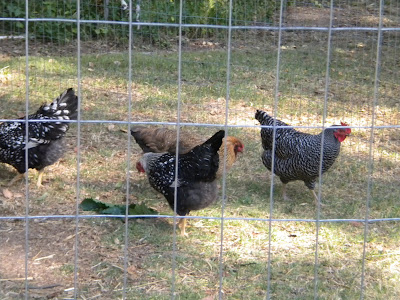We heard about the organic certification process and standards from Amy Lamendella, an inspector for California Certified Organic Farmers (CCOF). It was enlightening to hear what is regulated under the 2002 National Organic Program. Certification involves a lot of paperwork, documents and receipts; Amy described it as the process by which farmers document their practices and turn a physical enterprise into a verbal description. The National Organic Program is part of the USDA and a certification branch deals with all of the third-party labeling organizations. The USDA does not actually do any organic certifying, that is done by organizations like CCOF, Oregon Tilth, or QAI. Instead, the USDA is the overseer.
Contrary to popular belief, organic does not mean that pesticides are not used. Basically, synthetic substances are not allowed in organic agriculture unless specifically approved under the National Organic Program and all naturally occurring substances are allowed unless specifically prohibited. As a result, some natural and synthetic pesticides are still used in organic agriculture. However, farmers must document pest management strategies and show evidence that previous methods have failed before they are allowed to use some of the stronger pesticides.
Organic farms must purchase organic seed, if available, for both food crops and cover crops. Furthermore, soil organic matter must be maintained or improved under organic management. However, the National Organic Program does not regulate labor practices; inspectors turn a blind eye to illegal labor conditions and practices since it is not part of their protocol.
The organic program also has strict regulations for compost, specifically for piles that contain animal material. For organic certification of compost piles with manure, egg shells, or other animal products, piles must reach and maintain a temperature between 131ºF and 170ºF for 15 days and be turned at least 5 times during that period. However, if the compost is going to be applied to a field that will not have crops harvested from it for more than 120 days these requirements are not necessary. The certification of organic compost is incredibly important for farms that make and use their own compost. The piles at the CASFS farm at UCSC are tested to make sure that they meet the standards.
When farms seek organic certification, there is a three year transition period from the last application of prohibited substances. During this time, it can be hard to survive economically since conventional practices are prohibited but produce still can’t garner the organic price premium. One of the most interesting things is that if gross annual sales are not more than $5,000, growers must register as organic with the state but are not required to be certified. In other words, if our on-campus garden registers, our produce can be sold as organic as long as we adhere to the organic standards without having to pay for third-party certification.

















































